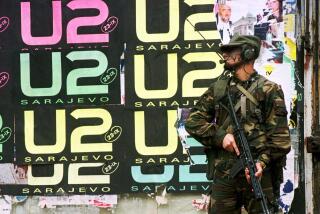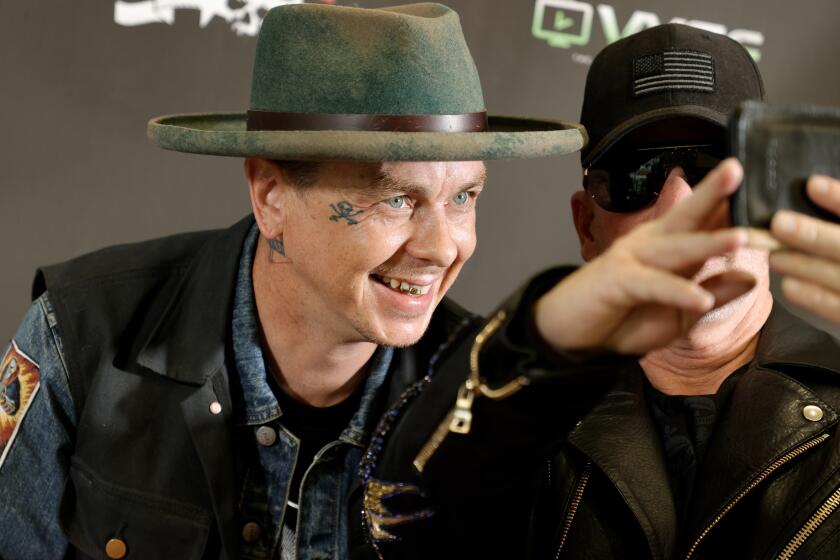POP : Negativland Tour Isn’t Tuned to New Album : but to Desperate Straits
For the first time in its 13-year career, Negativland is touring at about the same time it puts out an album. Lest anyone get the idea that the band is starting to do things conventionally , though, the timing is largely accidental--in fact, none of the new album will be performed on this tour, which lands at Bogart’s in Long Beach tonight.
There is little conventional about the four-man band from the Bay Area, whose productions are less songs than miniature aural landscapes, crowded with fragments of commercial jingles, political speeches, TV dialogue and other snippets of verbal traffic plucked from the gridlocked information highway.
The appropriation of sound bites is put primarily into the service of ideas, leavened with humor. “Helter Stupid” (1989) is about media manipulation; “Escape From Noise” (1987) asks whether there is any escape from noise, and includes a song, “Christianity Is Stupid,” that became the focus of the band’s first brush with controversy.
When Negativland had to cancel a tour after the record’s release, band members put out a press release facetiously tying a notorious murder in Minnesota to an argument over the song; several news agencies ran the story as fact.
It was in the fall of 1991, however, that the band made its biggest media splash in an incident that continues to embroil the band legally and financially. Negativland released a single on SST Records entitled “U2” that parodied “I Still Haven’t Found What I’m Looking For” and included outtakes of disc jockey Casey Kasem cursing after an introduction of the U2 song.
The corporate lawyers at Island Records decided to sue SST and the band (which had never sold more than 15,000 copies of a single record) for copyright infringement, deceptive advertising and “image defamation.” SST settled with Island, then turned around and asked Negativland to foot the $90,000 cost. The band asked SST to split the cost; SST later sued Negativland and is withholding royalties from its recordings. The case is slated to go to trial next spring.
Newspapers and music magazines followed the issue with glee, using the occasion to take shots at U2’s squeaky-clean image, even though the band members were reportedly unaware of the legal action until the publicity hit.
“It’s complex, it really is,” said Negativland member Mark Hosler from his home in Contra Costa County. “While I’ve always been a bit cynical about America in general, I thought there was still some kind of right and wrong.” In reality, he said he’s learned: “You get as much justice as you can afford.”
The episode illustrates how the music business is controlled by “managers and lawyers and CEOs and big business types,” and how the legal system is used by corporations to punish individuals who can’t afford to defend themselves, Hosler said.
“We’ve been using bits and pieces of the media as long as we’ve been around. . . . The bits and pieces that we use are our choices of color, our palette,” Hosler said. “Now we’ve been sued twice. How many times can we afford to be sued before we’re forced to quit?”
The brouhaha hasn’t affected the recording of the new album, “Free,” which was in the works before the U2 business started. The album is a pointed critique of America’s celebrated freedom, born in the band’s disgust over the Persian Gulf War. Sometimes devastating, sometimes hilarious, often both, the album anchors the usual sound bites to minimal musical touches, primarily keyboards and percussion.
Surprisingly, the band does not use electronic sampling in its recordings, but rather “razor blades and tape splicers,” Hosler said. “We’ve never had much money, really, is the basic thing.” The process is predictably slow; “Free” took 1 1/2 years to mix in the band’s home studio, after material was culled from thousands of hours of tape.
Live, the band uses tape “carts,” like those used in radio, to cue up the various sounds and sound bites. Negativland doesn’t tour often because of the cost involved in its multimedia productions, but this time it found it could make a tour profitable. “We were able to make some money,” Hosler said, “and we’re desperate to make some money right now.”
More to Read
The biggest entertainment stories
Get our big stories about Hollywood, film, television, music, arts, culture and more right in your inbox as soon as they publish.
You may occasionally receive promotional content from the Los Angeles Times.










